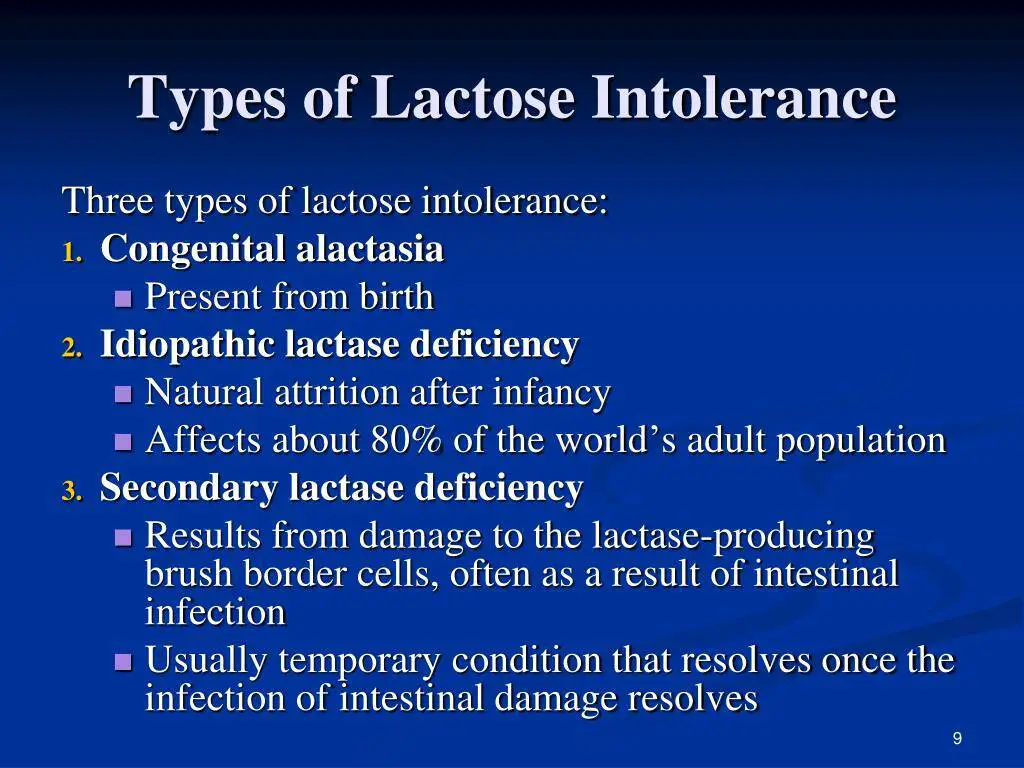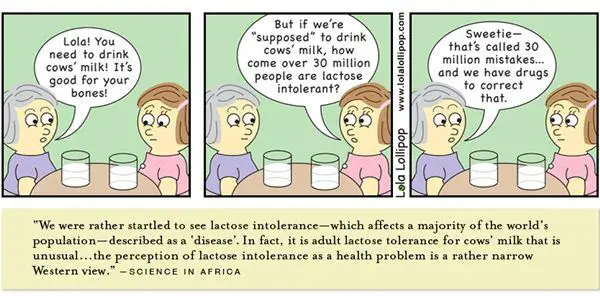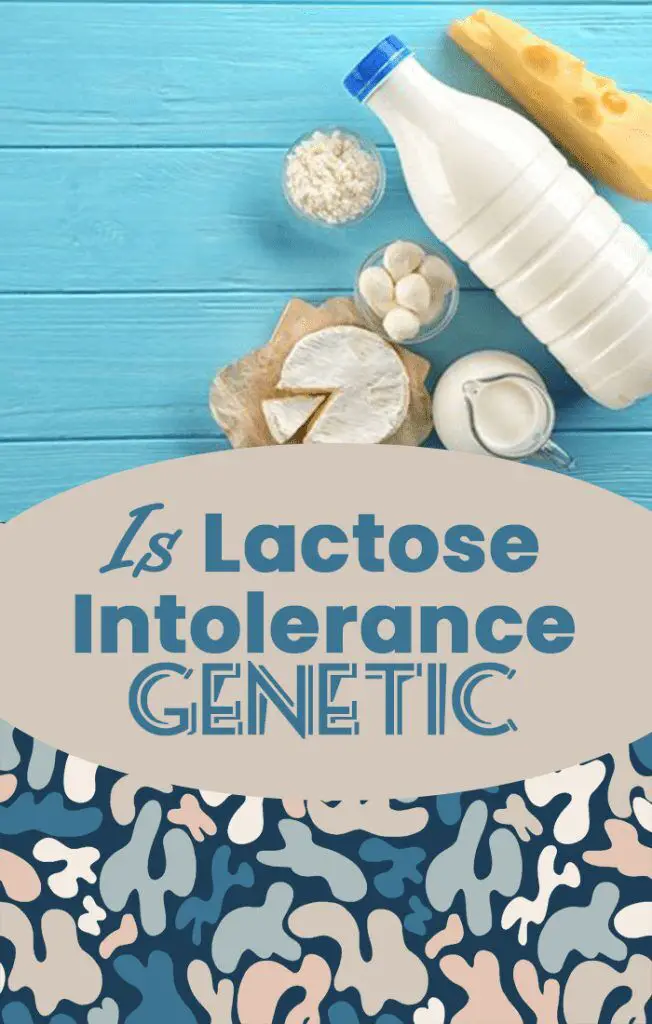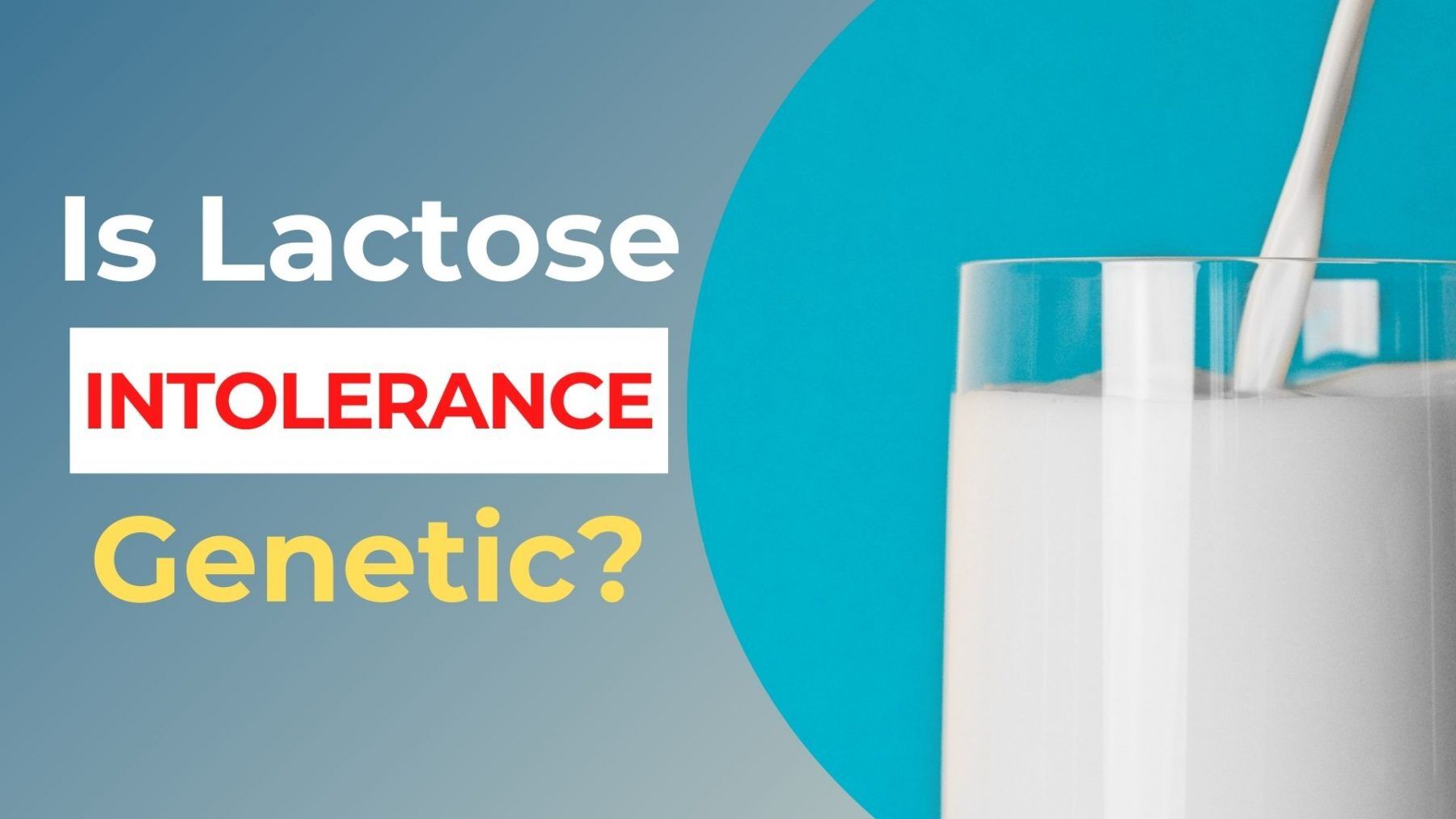Lactose is a type of sugar found in milk and other dairy products.
When we consume food or drinks containing lactose, the enzyme called lactase is produced in our intestines to break down that lactose.
That’s lactase with an A. Lactase is an enzyme. Lactose is what breaks down.
Lactase is important because without it, humans would not be able to digest any form of milk or dairy product.
If someone is unable to produce enough lactase due to various genetic mutations or for other reasons we’ll cover below …
Then they will lose their ability to digest lactose. They become Lactose Intolerant.
If you cannot digest lactose, then if you consume anything with lactose you will develop the symptoms of lactose intolerance:
- abdominal pain
- bloating
- cramping
- diarrhea
This is known as being “lactose intolerant” or having a “lactase deficiency”. Another word is lactase persistence (for people who do not become lactose intolerant).
This article is going to answer the question “Is lactose intolerance genetic?” The article will discuss types of Lactose Intolerance, inheritance, and more.
At the bottom is my take on why certain groups of people are more prone to lactose intolerance
Let’s dive in!
Most Common Type of Lactose Intolerance

Primary Lactose Intolerance
Primary Lactose Intolerance is the most common type of lactase deficiency. It is caused by a genetic mutation that prevents this enzyme from being produced in enough amounts.
It is estimated that about 30% of people in the world are affected by this condition.
Depending on the individual, their body will typically stop making lactose sometime before age 5.
As your lactase levels decrease, dairy products become more difficult to digest.
This makes dairy products difficult to digest by adulthood!
This type of Lactose Intolerance is caused by genetics. It is common among people of an African, Asian Hispanic or Mediterranean heritage. It’s less common if your heritage is from northern or western Europe.
For a discussion on these differences see final section of this blog article below.
Other Types of Lactose Intolerance
In addition to Primary Lactose Intolerance there are three other types:
- Secondary Lactose Intolerance
- Congenital Lactase Deficiency
- Developmental Lactose Intolerance
Secondary Lactose Intolerance is caused by an injury or illness that inhibits the production of lactase. This form is not due to genetic reasons unlike the more common Primary diagnosis.
This is more rare than Primary Lactose Intolerance. But it can happen after a triggering event.
About 20% of people have this condition at some point in their lives.
Congenital Lactose Intolerance (or Congenital Lactase Deficiency) is the most rare type. This is caused by an inherited genetic mutation that prevents the production of lactase in infants and children.
When this happens, they will be unable to digest any form of milk or dairy product. At least until their intestines mature later in life (usually around age five).
Developmental Lactose Intolerance is also less common because it is usually only present during a temporary developmental stage, like being an infant. It also does not cause as many symptoms.
Is Lactose Intolerance Genetic?

Yes!
About 30% of people in the world have a genetic mutation in their LCT gene. This is what prevents their ability to digest lactose.
This is the Primary Lactose Intolerance (or the Congenital Lactase Deficiency) we talked about earlier!
It is even possible for secondary inheritors to develop Lactose Intolerance as well. For example, your parents might not have lactase intolerance. But they may be carriers of the gene and passed it on to you!
However, not all types of lactose intolerance are genetic which we discuss more below.
Is Lactose Intolerance Inherited?
Yes! If someone is lactose intolerant it is possible to inherit this condition from a parent.
These mutations are passed down generation after generation. Until both parents carry them at some point. This leads to their child developing an intolerance.
The only way that an individual can develop the more rare types of Lactose is if they are born with a genetic mutation.
Can You Become Lactose Intolerant?
It is possible to become lactose intolerant because of injury or illness.
The most common way people become lactose intolerant is by developing Secondary Lactose Intolerance. This is the non-genetic reason I keep hinting at!
Secondary is usually caused by a triggering event. Like a virus that damages your gut lining where the lactase is made. For other risk factors see below.
Congenital is inherited from your parents as well as Developmental. These are both genetic in nature and related to age development.
Congenital can also be diagnosed through DNA testing. DNA testing is a good option if you were born with this type of gene mutation but never showed any symptoms until later on.
Lactose Intolerance Risk Factors
There is a genetic risk factor for lactose intolerance.
If you have one parent who is intolerant and the other is not, then your chances of developing it are 50%.
If neither of your parents has an intolerance then you have less chances of developing the deficiency.
But if there is another family member with this condition, then it’s possible one or both of your parents are carriers of the genes for Lactose Intolerance. Even though they don’t have any symptoms!
However, not all risk factors for Lactose Deficiency are genetic.
Some non-genetic factors that can lead to Lactose Intolerance include:
- taking certain medicines for a long period of time
- having a stomach virus
- drinking too much alcohol or caffeine
- eating an insufficient amount of vegetables and fruits
- having a hiatus hernia or gastroparesis
It is also possible to develop Secondary Lactose Intolerance. Especially if you do not eat enough vegetables and fruits.
And to be frank, this development could be due to any number of causes including illness like:
- Celiac Disease
- Irritable Bowel Syndrome
- Crohn’s Disease
- Colitis
- Diabetes
- Eating disorders like anorexia or bulimia
Why Certain Groups Are More Prone To Lactose Intolerance
To understand lactose intolerance we have to understand germs.
In Guns, Germs and Steel author Jared Diamond tried to answer a powerful question:
Why are some countries materially richer and more powerful than others?
(This ties into lactose intolerance, I promise!)
For example, when white people invaded what’s now known as America, why were they able to conquer the native tribes?
Dr. Diamond starts off by examining the role germs played in this conflict. He notes that around 90% of the native American Indian population died due to infection from smallpox and other germs passed on by the Europeans.
But why didn’t the Europeans die from smallpox too? If the viruses that killed all those natives were so deadly, then why didn’t the Europeans die too?
To answer this question Dr. Diamond looked at how ancient civilizations arose.
He noted that European cultures had evolved alongside animals like cows, chickens, and pigs for thousands of years.
Here is where lactose intolerance ties in …
Because Europeans lived with domesticated animals for thousands of years, they regularly consumed milk and dairy products.
Overtime, the European culture developed genes that gave them the ability to digest lactose! This is what’s today known as lactase persistence (the opposite of intolerance).

For more information on the genetics of lactase persistence, please be sure to read this Wiki article here.
Final Thoughts on Lactase Deficiency
The most common type of lactose intolerance is caused by a deficiency in the enzyme, lactase.
Lactase breaks down milk sugar (lactose) into simpler sugars that can be easily absorbed and used for energy.
If you are deficient in this enzyme, consuming even small amounts of dairy products will cause unpleasant digestive symptoms of lactose intolerance. Like bloating, gas or diarrhea! Ew!
For more info on Lactose Intolerance Symptoms, read my article here!



